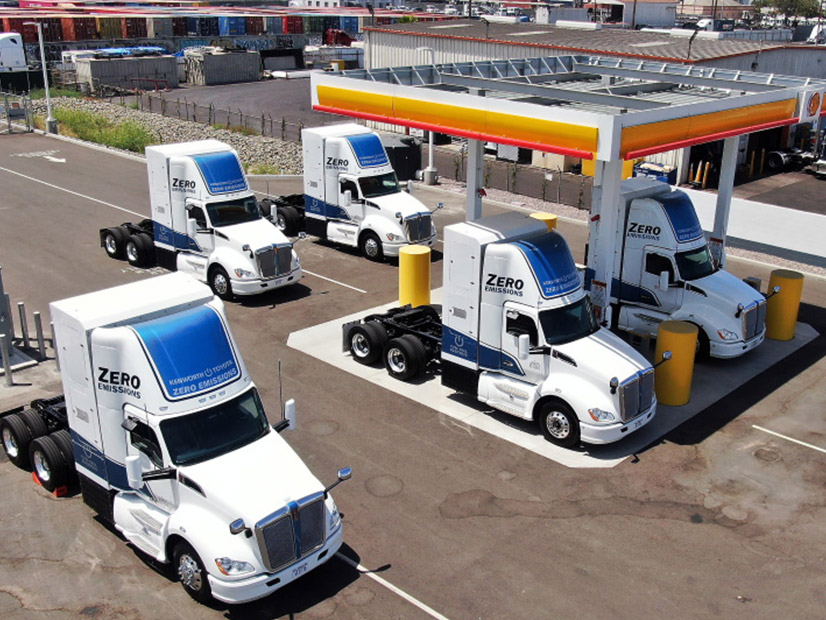Ten hydrogen fuel cell electric semi-trucks are beginning a yearlong test of their effectiveness at the Port of Los Angeles.
The 10 semis, manufactured by Kenworth in Renton, Wash., are being tested along with about 30 similar battery-operated trucks to see how their performance compares with traditional diesel trucks, port officials told NetZero Insider. The test run is scheduled to end in May 2022.
The test will examine how well the hydrogen-fueled and battery-powered semis pull loads and manage inclines and declines, with drivers also provide feedback on general handling, said Jacob Goldberg, the port’s project manager for the test. The port also wants to determine whether the fuel cell trucks can travel the promised 350 miles before refueling.
Goldberg and Christopher Cannon, the port’s director of environmental management, are also seeking real-world financial comparisons on the costs of operating all three types of vehicles, especially pertaining to fuel.
They said the purchase price for a new diesel semi is $110,000 to $120,000, roughly $350,000 for a battery-powered semi and an estimated $1 million for a hydrogen-fueled semi. The battery-powered and hydrogen-fueled trucks will be used only for short hauls lasting less than a day and not for multiday long hauls.
The tests are being financed by part of a $41 million Zero and Near-Zero Emissions Freight Facilities grant awarded by the California Air Resources Board, with the port as the prime applicant. The grant is part of California Climate Investments, a state initiative funded by billions of cap-and-trade dollars, according to a written statement from PACCAR, the company that owns Kenworth, which manufactured the hydrogen-fueled trucks. PACCAR is based in the Seattle suburb of Bellevue.
One apparent advantage of using a hydrogen truck over a battery truck is that the latter takes hours to recharge while the former can be refueled as fast as a conventional diesel truck, Goldberg and Cannon said. The port is doing the final safety checks for two on-site hydrogen refueling stations and expects to have another station running soon about 70 miles from the port.
Four years ago, the port set a goal of producing net-zero carbon emissions from its short-haul trucks by 2035.
“The problem is that the technology to reach those goals is still emerging,” Cannon said.
The port currently has about 18,000 long-haul and short-haul semi-trucks listed on its registry to use the port. Of that amount, 11,000 to 12,000 enter or leave the port at least once a week.
The fuel cell trucks are Kenworth T680s built with Toyota hydrogen fuel cell electric powertrains, with water being the only emissions, according to PACCAR. The trucks went through initial tests at a PACCAR facility in Mount Vernon, Wash.
In the written statement, Kenworth General Manager Kevin Baney said: “The Kenworth T680 on-highway flagship offers superior fuel efficiency, performance and comfort, and serves as an excellent foundation to develop the hydrogen fuel cell electric powertrain.”



